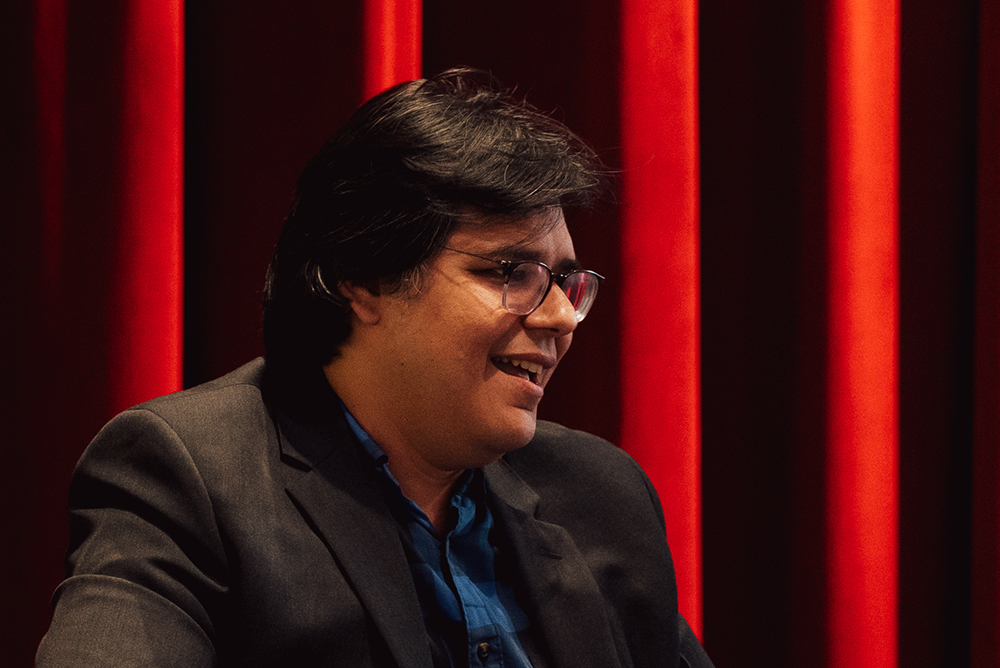
Photo by Chad Brady.
John Lopez is a writer, producer, and member of the AI working group in the Writer’s Guild of America. Before joining the panel for the Zócalo, Arts for LA, ASU Narrative and Emerging Media Program, and LACMA public program “Is AI the End of Creativity—Or a New Beginning?,” Lopez chatted with us in the green room about how he feels about his industry going forward, his go-to movie snack, and a piece of pop culture that’s getting AI right.
What’s your current ‘Roman Empire’?
I mean, I’ve got a Persian Empire. I’ve got a Roman Empire. I’ve got a Mayan empire. One is the future of journalism. It’s weird that there’s this kind of incentive not to do deep dives, and not to do probing reporting. And I think we need it more now than ever. I just hope that there’s a way that journalists can make a living doing this, because we need clarity, we need transparency, we need people digging and finding information that no one wants to talk about.
When did AI come on your radar?
I want to say around 2016 or ’17. I went up to visit some friends in the Bay Area. They had gotten interested in machine learning, and they played me a Bach cantata that was not written by Bach. And I remember my friends saying, Look, this is what’s possible! And I’m the kind of person who didn’t mind if I died in the gutter, if I made like one film or one work of art. And he showed me this, and he says, This is going to change the world. And I remember thinking, wow, this is genuinely impressive and genuinely interesting. But also, why? And that question I don’t think I’ve ever stopped asking, and I just hope the rest of the world starts asking that question too.
As a journalist, who was your favorite interview?
I’ll tell you the person I got the most flustered talking to was the artist Ed Ruscha. I had to do a piece for the L.A. Times about what artists want to do in the 21st century. I talked to a bunch of young artists, and then my editor said, you need to talk to someone senior. And he mentioned Ed Ruscha. And I was like, he’ll never talked to me. And of course, the power of the L.A Times is they hook you up, and I end up talking to him. And he was just the coolest guy. The excitement, and the enthusiasm and the passion that he had for younger artists was incredible and genuine and real, and made me just kind of realize the debt we owe the future in terms of making sure that people have a way for their voices to be heard and expressed.
What piece of pop culture do you think is getting AI right?
Mission: Impossible – Fallout! There’s a huge debate about whether or not AI is going to kill us all or not. And I’m not going to opine on that for this. But if you do want to follow that thread of a rational thought-out way that AI would kill us all, and the various methods it could do that, Christopher McQuarrie, or whoever wrote that script, clearly did some research and went into these forums where they think of all the possible ways, and he was like, this would make a good movie, and he actually did a pretty good job of turning that into a dramatic high-stakes action sequence. Also the train sequence at the end of the movie is just amazing.
Now that the Hollywood strikes are over, what’s one property coming out that you’re most excited about?
I’m excited for whatever Christopher Nolan does next. I loved Oppenheimer. I thought that was amazing. And I love the fact that it made $900 million. Because as a writer, you always take heart when a complicated, but important story somehow becomes a box office hit because it kind of like opens the window for what the rest of us can do.
Do you feel hopeful looking forward at your industry?
I’m decidedly ambiguous. I think all the signs are there to take the right lessons from the strike. But I always worry that Hollywood will never fail an opportunity to take the wrong lesson. And I think whatever you thought of the movie it was quite incredible thing that a movie about a 70-year-old toy that was turned into a feminist manifesto became the most successful movie of the year. Second only to a movie about J. Robert Oppenheimer and the atomic bomb. So that gives me hope. What doesn’t give me hope is that the studios seem not very interested in protecting the human element of our industry. And from my experience, it took a lot of fighting and yelling to remind them that at the end of the day, the point of art is generally, you might even say always, humanity.
We’re coming up on the new year: What’s a New Year’s resolution on your mind?
To get off Twitter.
You go to the movies. You see the snack bar. What’s your go-to purchase?
Reese’s Pieces with popcorn.
Do you put it together?
Yes, absolutely. It’s horrible. And I never do it because I’m getting older and I should probably eat a lot better but that in front of like a great movie. Oh my god. There’s nothing better.



